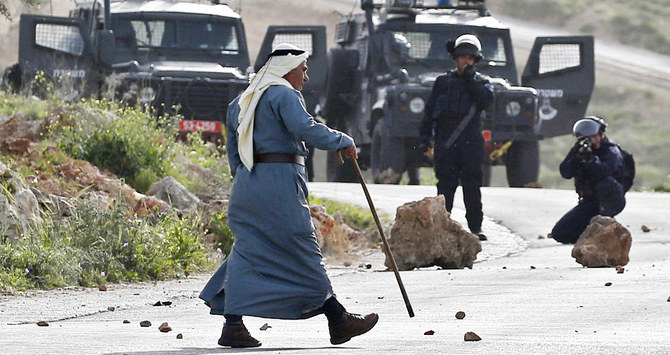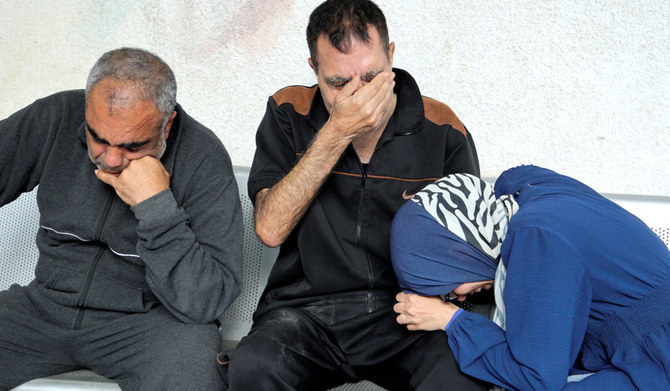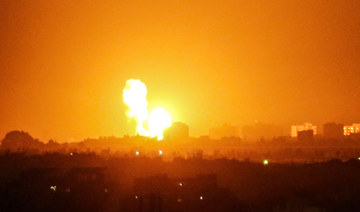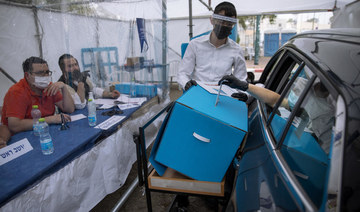UNITED NATIONS: The United Nations, United States, Russia and the European Union met virtually Tuesday to discuss relaunching their long-stalled effort to get Israel and the Palestinians to negotiate a two-state solution to their decades-old conflict.
A brief statement from the four Mideast mediators, known as the Quartet, said envoys discussed returning “to meaningful negotiations that will lead to a two-state solution, including tangible steps to advance freedom, security and prosperity for Palestinians and Israelis, which is important in its own right.”
There have been no substantive peace talks between Israel and the Palestinians since 2014, and the two sides are fiercely divided over the core issues of the conflict.
The United Nations sent out the statement on the Quartet discussion after polls closed in Tuesday’s Israeli election. Exit polls indicated there was no clear winner, leaving Prime Minister Benjamin Netanyahu’s fate uncertain and signaling continued political deadlock in Israel.
In late January, UN Secretary-General Antonio Guterres said there were “reasons to hope” for progress toward ending the Israeli-Palestinian conflict after years of inaction. He said the United Nations would explore all initiatives to facilitate “a true peace process” based on the two-state solution.
Clearly referring to the former US administration, without naming then president Donald Trump, Guterres said “we were completely locked down in a situation in which there was no progress visible.”
The Trump administration provided unprecedented support to Israel, recognizing Jerusalem as Israel’s capital, moving the US Embassy from Tel Aviv, slashing financial assistance for the Palestinians and reversing course on the illegitimacy of Israeli settlements on land claimed by the Palestinians.
For more than three decades, the Palestinians have sought an independent state in the West Bank, Gaza and east Jerusalem, territories seized by Israel in the 1967 war. Israel withdrew from Gaza in 2005 but imposed a crippling blockade when the Palestinian militant group Hamas seized power from Palestinian President Mahmoud Abbas’ forces in 2007.
Israel has annexed east Jerusalem — a step that is not internationally recognized — and has said it has no intention of dismantling any of its West Bank settlements, which the United Nations says are illegal under international humanitarian law. Nearly 500,000 Israelis live in the West Bank, in addition to more than 200,000 in east Jerusalem.
The peace plan unveiled by Trump in February 2020 envisioned a disjointed Palestinian state that turned over key parts of the West Bank to Israel, siding with Israel on key contentious issues including borders and the status of Jerusalem and Jewish settlements. It was vehemently rejected by the Palestinians.
Soon after US President Joe Biden was inaugurated on Jan. 20, his administration announced that it was restoring relations with the Palestinians and renewing aid to Palestinian refugees, a reversal of Trump’s cutoff and a key element of its new support for a two-state solution.
Secretary-General Guterres made clear in January that Biden’s more even-handed approach opened the possibility of Quartet meetings previously blocked by the US, as well as broader peace efforts.
The Quartet was established in 2002 and has been criticized for its failure to get either Israel or the Palestinian Authority to change their policies and negotiate an end to their conflict.
Tuesday’s statement by the Quartet envoys did not mention any future steps.
It did say the envoys discussed “the situation on the ground, in particular the COVID-19 pandemic, the unsustainable disparity in economic development between Israelis and Palestinians, and the need for the parties to refrain from unilateral actions that make a two-state solution more difficult to achieve.”
UN, US, Russia and EU meet virtually on Israel, Palestinians
https://arab.news/cqr2a
UN, US, Russia and EU meet virtually on Israel, Palestinians

Israel attacks Rafah after Hamas claims responsibility for deadly rocket attack

- Hamas claims attack on Kerem Shalom crossing into Gaza that Israel says killed three soldiers
- Sunday's attack on the crossing came as hopes dimmed for ceasefire talks underway in Cairo
CAIRO: Three Israeli soldiers were killed in a rocket attack claimed by Hamas armed wing, near the southern Gaza Strip city of Rafah, where Palestinian health officials said at least 19 people were killed by Israeli fire on Sunday.
Hamas's armed wing claimed responsibility on Sunday for an attack on the Kerem Shalom crossing into Gaza that Israel said killed three of its soldiers.
Israel's military said 10 projectiles were launched from Rafah in southern Gaza towards the area of the crossing, which it said was now closed to aid trucks going into the coastal enclave. Other crossings remained open.
Hamas' armed wing said it fired rockets at an Israeli army base by the crossing, but did not confirm where it fired them from. Hamas media quoted a source close to the group as saying the commercial crossing was not the target.
More than a million Palestinians are sheltering in Rafah, near the border with Egypt.
Shortly after the Hamas attack, an Israeli airstrike hit a house in Rafah killing three people and wounding several others, Palestinian medics said.
The Israeli military confirmed the counter-strike, saying it struck the launcher from which the Hamas projectiles were fired, as well as a nearby "military structure".
"The launches carried out by Hamas adjacent to the Rafah Crossing ... are a clear example of the terrorist organisation's systematic exploitation of humanitarian facilities and spaces, and their continued use of the Gazan civilian population as human shields," it said.
Hamas denies it uses civilians as human shields.
Just before midnight, an Israeli air strike killed nine Palestinians, including a baby, in another house in Rafah, Gaza health officials said. They said the new strike increased the death toll on Sunday to at least 19 people.
Israel has vowed to enter the southern Gaza city and flush out Hamas forces there, but has faced mounting pressure to hold fire as the operation could derail fragile humanitarian efforts in Gaza and endanger many more lives.
Sunday's attack on the crossing came as hopes dimmed for ceasefire talks under way in Cairo.
The war began after Hamas stunned Israel with a cross-border raid on Oct. 7 in which 1,200 people were killed and 252 hostages taken, according to Israeli tallies.
More than 34,600 Palestinians have been killed, 29 of them in the past 24 hours, and more than 77,000 have been wounded in Israel's assault, according to Gaza's health ministry.
Israel military begins evacuating Palestinian civilians from Rafah, radio says

- More than a million Palestinians are sheltering in Rafah, near the border with Egypt
- Three Israeli soldiers earlier killed in a rocket attack claimed by Hamas armed wing
CAIRO/JERUSALEM: Israel’s armed forces have begun evacuating Palestinian civilians from Rafah ahead of a threatened assault on the southern Gazan city, an Israeli broadcaster said on Monday.
The military gave no immediate confirmation of the report on Army Radio.
According to the report, the evacuations were now focused on a few peripheral districts of Rafah, from which, it said, evacuees would be directed to tent cities in nearby Khan Younis and Al Muwassi.
Seven months into its offensive against Hamas, Israel has said Rafah harbors thousands of the Palestinian Islamist group’s fighters and that victory is impossible without taking the city.
But with more than a million displaced Palestinians sheltering in Rafah, the prospect of a high-casualty operation worries Western powers and neighboring Egypt.
Three Israeli soldiers were earlier killed in a rocket attack claimed by Hamas armed wing, near the southern Gaza Strip city of Rafah, where Palestinian health officials said at least 19 people were killed by Israeli fire on Sunday.
Hamas’s armed wing claimed responsibility on Sunday for an attack on the Kerem Shalom crossing into Gaza that Israel said killed three of its soldiers.
Israel’s military said 10 projectiles were launched from Rafah in southern Gaza towards the area of the crossing, which it said was now closed to aid trucks going into the coastal enclave. Other crossings remained open.
Hamas’ armed wing said it fired rockets at an Israeli army base by the crossing, but did not confirm where it fired them from. Hamas media quoted a source close to the group as saying the commercial crossing was not the target.
More than a million Palestinians are sheltering in Rafah, near the border with Egypt.
Shortly after the Hamas attack, an Israeli airstrike hit a house in Rafah killing three people and wounding several others, Palestinian medics said.
The Israeli military confirmed the counter-strike, saying it struck the launcher from which the Hamas projectiles were fired, as well as a nearby “military structure”.
“The launches carried out by Hamas adjacent to the Rafah Crossing ... are a clear example of the terrorist organisation’s systematic exploitation of humanitarian facilities and spaces, and their continued use of the Gazan civilian population as human shields,” it said.
Hamas denies it uses civilians as human shields.
Just before midnight, an Israeli air strike killed nine Palestinians, including a baby, in another house in Rafah, Gaza health officials said. They said the new strike increased the death toll on Sunday to at least 19 people.
Israel has vowed to enter the southern Gaza city and flush out Hamas forces there, but has faced mounting pressure to hold fire as the operation could derail fragile humanitarian efforts in Gaza and endanger many more lives.
Sunday’s attack on the crossing came as hopes dimmed for ceasefire talks under way in Cairo.
The war began after Hamas stunned Israel with a cross-border raid on Oct. 7 in which 1,200 people were killed and 252 hostages taken, according to Israeli tallies.
More than 34,600 Palestinians have been killed, 29 of them in the past 24 hours, and more than 77,000 have been wounded in Israel’s assault, according to Gaza’s health ministry.
Netanyahu uses Holocaust ceremony to brush off international pressure against Gaza offensive

- The ceremony ushered in Israel’s first Holocaust remembrance day since the Oct. 7 Hamas attack that sparked the war, imbuing the already somber day with additional meaning
JERUSALEM: Israeli Prime Minister Benjamin Netanyahu on Sunday rejected international pressure to halt the war in Gaza in a fiery speech marking the country’s annual Holocaust memorial day, declaring: “If Israel is forced to stand alone, Israel will stand alone.”
The message, delivered in a setting that typically avoids politics, was aimed at the growing chorus of world leaders who have criticized the heavy toll caused by Israel’s military offensive against Hamas militants and have urged the sides to agree to a ceasefire.
Netanyahu has said he is open to a deal that would pause nearly seven months of fighting and bring home hostages held by Hamas. But he also says he remains committed to an invasion of the southern Gaza city of Rafah, despite widespread international opposition because of the more than 1 million civilians huddled there.
“I say to the leaders of the world: No amount of pressure, no decision by any international forum will stop Israel from defending itself,” he said, speaking in English. “Never again is now.”
Yom Hashoah, the day Israel observes as a memorial for the 6 million Jews killed by Nazi Germany and its allies in the Holocaust, is one of the most solemn dates on the country’s calendar. Speeches at the ceremony generally avoid politics, though Netanyahu in recent years has used the occasion to lash out at Israel’s archenemy Iran.
The ceremony ushered in Israel’s first Holocaust remembrance day since the Oct. 7 Hamas attack that sparked the war, imbuing the already somber day with additional meaning.
Hamas militants killed some 1,200 people in the attack, making it the deadliest violence against Jews since the Holocaust.
Israel responded with an air and ground offensive in Gaza, where the death toll has soared to more than 34,500 people, according to local health officials, and about 80 percent of Gaza’s 2.3 million people are displaced. The death and destruction has prompted South Africa to file a genocide case against Israel in the UN’s world court. Israel strongly rejects the charges.
On Sunday, Netanyahu attacked those accusing Israel of carrying out a genocide against the Palestinians, claiming that Israel was doing everything possible to ensure the entry of humanitarian aid to the Gaza Strip.
The 24-hour memorial period began after sundown on Sunday with a ceremony at Yad Vashem, Israel’s national Holocaust memorial, in Jerusalem.
There are approximately 245,000 living Holocaust survivors around the world, according to the Claims Conference, an organization that negotiates for material compensation for Holocaust survivors. Approximately half of the survivors live in Israel.
On Sunday, Tel Aviv University and the Anti-Defamation League released an annual Antisemitism Worldwide Report for 2023, which found a sharp increase in antisemitic attacks globally.
It said the number of antisemitic incidents in the United States doubled, from 3,697 in 2022 to 7,523 in 2023.
While most of these incidents occurred after the war erupted in October, the number of antisemitic incidents, which include vandalism, harassment, assault, and bomb threats, from January to September was already significantly higher than the previous year.
The report found an average of three bomb threats per day at synagogues and Jewish institutions in the US, more than 10 times the number in 2022.
Other countries tracked similar rises in antisemitic incidents. In France, the number nearly quadrupled, from 436 in 2022 to 1,676 in 2023, while it more than doubled in the United Kingdom and Canada.
“In the aftermath of the October 7 war crimes committed by Hamas, the world has seen the worst wave of antisemitic incidents since the end of the Second World War,” the report stated.
Netanyahu also compared the recent wave of protests on American campuses to German universities in the 1930s, in the runup to the Holocaust. He condemned the “explosion of a volcano of antisemitism spitting out boiling lava of lies against us around the world.”
Nearly 2,500 students have been arrested in a wave of protests at US college campuses, while there have been smaller protests in other countries, including France. Protesters reject antisemitism accusations and say they are criticizing Israel. Campuses and the federal government are struggling to define exactly where political speech crosses into antisemitism.
Hezbollah fires rockets at Israel after south Lebanon strike kills 4 members of family

- Shells fall on Kiryat Shmona and reach northern Golan
- Maronite Patriarch Bechara Al-Rahi calls for end to war in southern Lebanon
BEIRUT: An Israeli airstrike killed four members of a family in a border village in southern Lebanon on Sunday, security sources said.
Hezbollah, in retaliation, fired Katyusha rockets at the northern Israeli town of Kiryat Shmona, close to the Lebanese border.
The four family members killed in Mays Al-Jabal were identified as Fadi Hounaikah and Maya Ali Ammar, and their sons Mohammed, 21, and Ahmad, 12.
The attack occurred when the family took advantage of a de-escalation of hostilities between Hezbollah and Israel to return to their properties to assess damage and move goods from their supermarket to a location outside the village.

A security source in the area told Arab News that while the family was gathering their groceries from the supermarket, an Israeli military drone spotted them and launched an attack, destroying the area and killing all the members of the family and injuring several civilians in the vicinity.
The source clarified that villages in the area were empty because “residents fled the area seven months ago.”
He added: “When residents want to enter these villages to attend victims’ funerals, they send their names and car number plates to the Lebanese Army and UNIFIL, who in turn coordinate with the Israeli side to spare these funerals (from attack).
“In general, people cannot enter border villages without taking into consideration the Israeli danger, as Israeli reconnaissance planes and drones are hovering over the area 24/7. However, what Israel committed against this family is a terrible massacre.”
Hezbollah responded to the incident by launching dozens of Katyusha and Falaq missiles at Israel. The group said the operation was “in response to the crime committed by Israel in the Mays Al-Jabal village.”
The Israeli Upper Galilee Regional Council announced that missiles hit buildings in Kiryat Shmona, while Israeli Army Radio reported that some of the rockets fell inside the city, causing a power outage.
An Israeli army spokesman reported that 65 rockets were launched from southern Lebanon toward Israeli settlements in the Upper Galilee region.
Meanwhile, Israeli airstrikes hit the villages of Al-Adissa and Kafr Kila, while artillery shelling hit the village of Aitaroun.
Maronite Patriarch Bechara Al-Rahi in his Sunday sermon called for an end to the war in southern Lebanon, urging an end to the “demolition of homes, the destruction of shops, the burning of the land and its crops, and the killing and displacement of innocent civilians and the destruction of their livelihood in an economic condition that has already impoverished them.”
Mohammed Raad, leader of Hezbollah’s parliamentary bloc, meanwhile, expressed his disapproval of the West’s backing for Israel.
He said that Israel “faces no international deterrent. On the contrary, some support it in committing crimes.”
He accused those who support Israel of being “hypocrites and liars who falsely claim to champion human rights, civilization, and progress in the West, (yet) they provide Israel with financial aid, weapons, smart bombs, and a continuous air bridge.”
Raad concluded: “We are not afraid of Israel’s insanity. We are prepared to confront them directly. We are prepared to sacrifice and shed blood to protect our homeland, independence, and honor.”
UNRWA chief says again barred entry to Gaza by Israel

- “Just this week, they have denied — for the second time — my entry to Gaza where I planned to be with our UNRWA colleagues including those on the front lines”: Lazzarini
JERUSALEM: The head of the UN agency for Palestinian refugees, UNRWA, said Sunday that Israeli authorities had barred him from entering Gaza for a second time since the Israel-Hamas war started on October 7.
“Just this week, they have denied — for the second time — my entry to Gaza where I planned to be with our UNRWA colleagues including those on the front lines,” Philippe Lazzarini wrote on X, formerly Twitter.
Lazzarini has been to Gaza four times since the war broke out including on March 17.
“The Israeli authorities continue to deny humanitarian access to the United Nations,” he said on Sunday.
“Only in the past two weeks, we have recorded 10 incidents involving shooting at convoys, arrests of UN staff including bullying, stripping them naked, threats with arms & long delays at checkpoints forcing convoys to move during the dark or abort,” Lazzarini said.
He also called for an “independent investigation” into rocket fire that led to the closure of a key Israel-Gaza aid crossing.
Hamas’s armed wing, Ezzedine Al-Qassam Brigades, claimed responsibility for the Sunday launch, saying militants had targeted Israeli troops in the area of Kerem Shalom crossing.


















